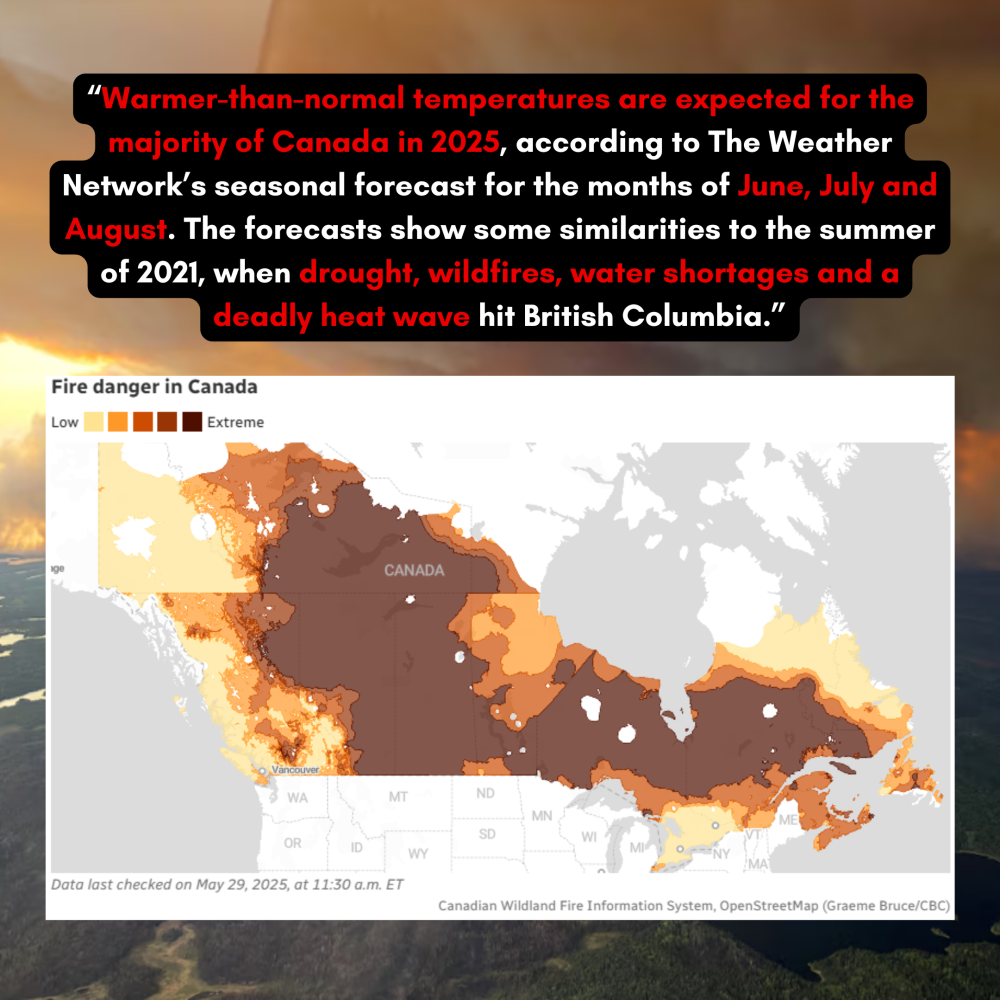
Dear Toronto City Councillor,
On behalf of ClimateFast, I am writing to you in response to the wildfire smoke we are currently experiencing here in Toronto. ClimateFast is a grassroots climate group with over 2,000 members who fight for urgent, meaningful, and equitable action on climate change. We would like to share our concerns with you and urge you to act on addressing the public health impacts of the wildfire smoke.
It’s simple: when forests burn, it releases smoke and people struggle to breathe and spend time outside. This is a huge public health risk. Wildfire smoke can make people feel shortness of breath, coughing, throat irritation, wheezing, eye and nose irritation, and headaches. Doctors say that it also increases asthma-related emergency department visits and poses a greater health risk for those between the ages of 65 and older, infants and young children, pregnant women, people with existing or chronic illnesses including heart disease, lung conditions, or diabetes, and people who work outdoors. In Toronto, there are around 384,300 infants and children as well as 476,990 people ages 65 and older. All these individuals are at a greater health risk due to the wildfire smoke currently enveloping our city. Although the wildfire smoke is from outside Toronto, it still impacts the quality of life of many Torontonians.
Toronto has a responsibility to lower its GHG emissions as much as possible to reduce the risk of climate change. When climate groups, like ours, write to elected officials on the importance of climate change, it is to reduce and prevent the health risk of the things like the wildfire smoke we’re seeing now. Over the coming decades, the science says that annual forest fires in Manitoba and northern Ontario will continue to impact many more Torontonians more frequently and severely as the impact of climate change worsens and Toronto’s population grows and ages.
Climate change is increasing the frequency and size of forest fires across Canada, greatly increasing our exposure to wildfire smoke. What is the largest contributor to this problem? The burning of fossil fuels – coal, oil, and gas – is by far the largest contributor to climate change, accounting for over 75% of global greenhouse gas emissions and nearly 90% of all carbon dioxide emissions. As greenhouse gas emissions blanket the Earth, they trap the sun’s heat. This leads to global warming and climate change.
To protect current and future generations from wildfire smoke, please consider every opportunity for the City of Toronto to transition off of fossil fuels, build more resilient communities, and invest in public health education on wildfire smoke. Here are our recommendations:
- Please offer carbon dioxide monitors at libraries and City offices for borrowing: The City of Vancouver for example allows for people to borrow a carbon dioxide (CO2) monitor from a Vancouver office (and libraries), free of charge, for a maximum of seven days. I have friends in Vancouver who borrowed these devices and have now personally purchased these monitors for themselves after seeing how valuable they are. These devices help start conversations on air quality and go like hot cakes!
- Ensure that Toronto’s Health Relief Network (which primarily intends to provide cooling centres) also allows for people to find indoor spaces across the city that have clean, non-smoky air. Many people experiencing visible and invisible homelessness face health challenges and are more vulnerable to wildfire smoke.
- Allocate significantly more funding to support the expansion of transit and cycling networks, adequately fund Live Green Toronto programs such as the Home Energy Loan Program (HELP), and electrify all City assets. We also support the expansion of housing options such as multiplex housing and mixed-use neighbourhoods as this helps with energy efficiency.
- More community engagement and interactive public awareness campaigns on the health impacts of wildfires on Torontonians and its connection to climate change and fossil fuels. This includes regular, educational posts on the City of Toronto’s social media and youtube videos that involve communities. Moreover, one of the key priorities from Toronto Public Health's Strategic Plan 2024-2028, is to strengthen health protection, disease prevention, and emergency preparedness. Public health can fulfill this priority by being proactive on public engagement and communication on climate.
- Normalize the conversation on the intersection between climate change impacts and public health. All elected leaders have a responsibility to shape the dialogue and connect the dots on public health and climate change. Please help normalize this dialogue and protect the topic of climate change from being politicized in City Council. Addressing the impact of climate change should not be a politically divisive issue. All councillors and staff have a responsibility to connect the dots using scientific evidence.
As a Toronto resident, I ask you to consider meeting with ClimateFast to explore the impact of climate change on public health. We would be happy to provide background briefings and additional materials that could support your work.
Thank you for your public service and I look forward to hearing back from you soon.
Sincerely,
Anna H. (she/her)
